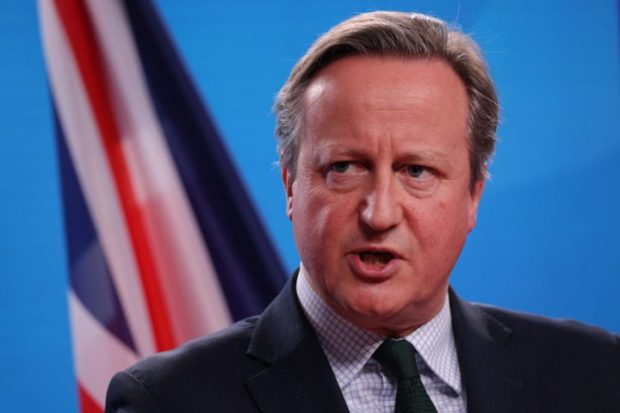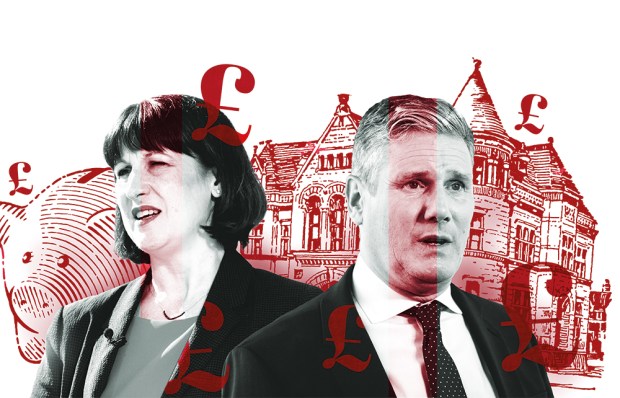The more the SNP decries the Internal Market Bill, the more I warm to it. Initially, I considered it sensible enough but wholly insufficient given the constitutional threat facing the United Kingdom. (Less keen on the law-breaking bit, mind.) But now Mike Russell, SNP constitution minister and professional hysteric, says the Bill will ‘undercut the existing settlement’ by allowing devolved administrations to be ‘overridden by the whim of the UK Secretary of State’ and by permitting ministers to spend ‘in opposition to the Scottish government’ in what he calls ‘an enormous assault on the devolved powers’. Now, that’s more like it.
When Russell talks like this, I go to my happy place and imagine a government actually having the gumption to stare down the devolution industry and the demolition merchants of the Union. Unfortunately, Russell’s shrieks are sheer hyperbole. The Bill standardises regulatory frameworks across the UK and explicitly allows the UK government to spend directly in the nations and regions. (I say ‘explicitly’ because I can’t see what is preventing them from doing so at present.) It does strengthen the Union somewhat but comes nowhere near the comprehensive reform that is needed.
Yet, on the basis of his mischaracterisation of the Bill, Russell claims there is ‘a hostility to devolution’ in the UK government. As someone who has been banging his head against a brick wall trying to get ministers to understand the structural flaws in devolution, I can attest that there is no hostility. There is no affection either, but no one of any seniority in government is ready to confront the challenge of reforming devolution, though I suspect Michael Gove at least grasps the scale of the problem. The government’s sin is not hostility but indifference — and cowardice. It is the combination of the two that is allowing the SNP to drag the United Kingdom a little closer to death’s door each day.
The absurdity in all this is that it is Mike Russell who harbours hostility towards devolution. It is he who wants to undercut the current settlement. He who wants to abolish it entirely and replace it with a separate state. It is his government which has sought to provoke, inflame, divide, obstruct and wreck relations between Holyrood and Westminster. Yet the dismantlers of devolution can pose as its guardians with little pushback. This is what institutional and ideological capture looks like.
It is also what democratic dysfunction looks like. In a country with a more robust political system, in which parliament was meaningfully independent of the executive, civil society not ideologically intimate with the ruling party, and broadcasters uncowed and uncommitted, that capture would have been more difficult to achieve — the SNP’s pose as ‘defender of devolution’ at least met by the occasional streak of scepticism. Scepticism is in short supply in Scotland these days.
Opponents of nationalism — they can’t even agree on an -ism of their own — can easily fall into the trap of blaming the other side, the institutions, the media, even the country. They are less inclined to point the finger at themselves, not least because that would involve first determining who they are.
Nationalists have competing ideas for what to do with Scotland after Scexit but they are as one that Scexit must happen and more or less agree how it should happen. Their critics are hopelessly divided on why they are against nationalism, how to resist it and what to offer in its place. Some advocate federalism or full fiscal autonomy, others support status-quo devolution, and a few realise devolution was a grave error but daren’t say it out loud. A growing number, mostly attached to Scottish Labour, have already moved on from the Union in their heads and soon enough their hearts will follow. There is no ‘pro-Union movement’, just different strands of existential crisis wishing it would all go away.
The neuroses that beset the leadership are not universal to the non-nationalist side of politics. A large minority of Scots have hardened on the constitutional question. They want no more referendums and no more power transfers. They want Scotland to remain in the Union and do not spend their days wringing their hands over what they believe. These voters have no party that represents them, no leader inside or outside Holyrood who stands for what they stand for. They want to be left in peace from the constant, enervating threat of Scexit. They want someone to tell Nicola Sturgeon ‘no’ and have the guts to stick to it. The Scottish Tories, Scottish Labour and Scottish Lib Dems — co-architects of the hyper-devolution that has empowered the SNP and brought the Union to the brink — have nothing to offer them except another vow, another Scotland Act, another capitulation to the separatists down the line.
The outlines of just such a capitulation can be seen in the proposal from Reform Scotland founder Ben Thomson. The investment banker wants home rule, whereby the Scottish parliament is in charge of everything except defence, foreign affairs and monetary policy. I’m not a communist; I’m in favour of rich people having money. It’s them having ideas that bothers me. The problem with Thomson’s idea, which he partly concedes, is that it’s the same idea that the devocrats have been having for generations. Home rule, federalism, devo max — all are premised on the fallacy that you can save the Union by giving more institutional power to those committed to destroying it. It has been tried by governments Labour, coalition and Tory and all it has achieved is ever-weaker Union. Some ideas just don’t work, even if everyone on your LinkedIn thinks they’re splendid.
The clever people of Scottish politics and punditry insist that supporters of the Union meet the nationalists in the middle without expecting the nationalists to move an inch. But pro-Union voters should not acquiesce to defeat just because the think-tanker and lobbyist class would rather they didn’t make a fuss. If Scotland is to remain on this constitutional pivot until victory for one camp or another, Scots who believe in the Union should work for victory to be theirs. They should make a fuss. They should demand a movement and a political party that represents them and leaders who share their convictions. Instead of an inevitable shuffle towards Scexit guided by an elite that disagrees only in the margins, Scotland’s constitutional debate should be an actual debate — with two sides, not one-and-a-half.
Law-breaking capers aside, the Internal Market Bill is unobjectionable and, in places, very much welcome, but it falls far short of either Mike Russell’s histrionics or the character of devolution reform necessary to save the United Kingdom. As much as laws, however, supporters of the Union need a movement that can match in confidence, conviction and determination the forces they are up against.
Got something to add? Join the discussion and comment below.
Get 10 issues for just $10
Subscribe to The Spectator Australia today for the next 10 magazine issues, plus full online access, for just $10.




















Comments
Don't miss out
Join the conversation with other Spectator Australia readers. Subscribe to leave a comment.
SUBSCRIBEAlready a subscriber? Log in